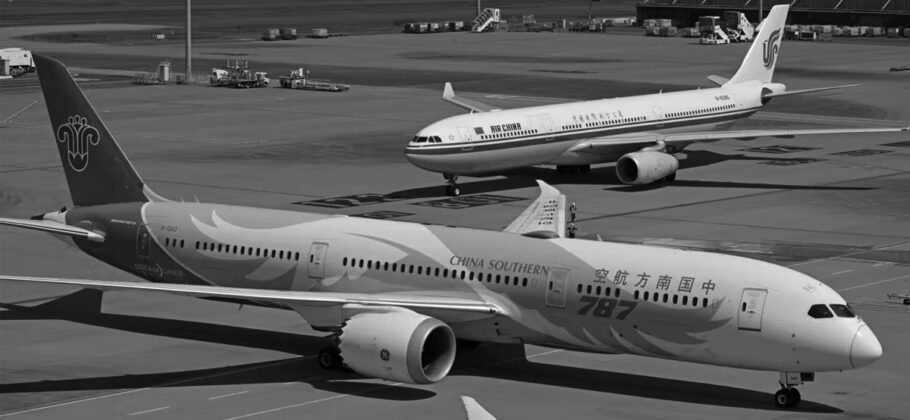Chinese Airlines Told to Halt All Boeing Deliveries
China has taken a major step in its ongoing economic conflict with the United States by telling its airlines to stop accepting aircraft from Boeing. This decision is part of a broader retaliation effort in response to President Donald Trump’s steep tariffs on Chinese imports. According to Bloomberg, Chinese airlines have also been told to stop buying airplane parts and equipment from U.S. companies. These developments signal that China is using the aviation industry as a pressure point in the widening trade war.
The Chinese government has not made an official public statement on the matter, but multiple news outlets have confirmed the ban through unnamed sources familiar with the policy. This action directly affects Boeing, one of America’s most important exporters, and reflects the high stakes in the ongoing confrontation between the two largest economies in the world.
The Economic Impact on Boeing and the U.S.
Boeing is a massive part of the U.S. economy. It contributes about $79 billion in economic output each year and supports around 1.6 million jobs, both directly and indirectly. Boeing also employs nearly 150,000 people in the U.S. According to Bank of America aerospace analyst Ronald Epstein, “Boeing is the U.S.’s largest exporter, as such, we are not surprised by China’s move; however, we do see this as unsustainable.” He added, “When considering balances of trade, we think the Trump Administration can’t ignore Boeing.”
Boeing receives about two-thirds of its commercial orders from foreign customers, with China historically being one of its biggest markets. In 2018, China made up nearly 25 percent of Boeing’s deliveries. Boeing had estimated that China would need about 8,830 new aircraft over the next 20 years.
CEO Kelly Ortberg has been vocal about the importance of international trade to Boeing’s survival. Speaking at a recent Senate hearing, Ortberg said, “Free trade is very important to us. We really are the ideal kind of an export company where we’re outselling internationally. It’s creating U.S. jobs, long-term high-value U.S. jobs.” Ortberg has opposed the tariffs imposed by the Trump administration, warning that they could damage American manufacturers.
Boeing Already Under Pressure
This latest challenge comes at a difficult time for Boeing. The company has been dealing with years of setbacks, including the fallout from two deadly crashes involving its 737 Max planes in 2018 and 2019. Those crashes led to a worldwide grounding of the aircraft, and Chinese regulators were especially slow to approve the plane’s return to service.
Boeing also experienced a major labor strike that halted production of the 737 Max and other models for seven weeks. Combined with supply chain issues and declining orders, Boeing has lost $51 billion in operating income since 2018 and has not posted an annual profit in six years.
Deliveries are especially important for Boeing because that is when the company receives most of its payments. As of the end of 2024, Boeing had 55 completed planes sitting in inventory, many of which were meant for Chinese and Indian airlines. Without delivery, those payments are delayed or canceled altogether. Following the news of the halted orders, Boeing’s stock dropped as much as 4.6 percent in premarket trading and was down about 10 percent for the year by mid-April.
President Trump’s Response and the Political Backdrop
President Trump acknowledged the situation in a social media post, writing, “China just reneged on the big Boeing deal, saying that they will ‘not take possession’ of fully committed to aircraft.” The White House has not released a formal statement, but Trump’s acknowledgment shows the seriousness of the situation.
Trump has made tariffs a central part of his trade strategy with China. The administration recently imposed tariffs as high as 145 percent on Chinese imports, and China responded with 125 percent tariffs on American goods. Those tariffs have more than doubled the cost of Boeing jets for Chinese buyers, making them nearly impossible to afford.
The trade war has now touched nearly every major industry, from agriculture to electronics, and the aviation sector has become one of the highest-profile casualties. Trump’s critics argue that his hardline approach is creating more problems than solutions. Some have warned that these policies are pushing long-time trade partners to look elsewhere.
Where Could Boeing Sell the Planes Instead?
Despite the loss of the Chinese market, Boeing may still find other buyers for its aircraft. According to Bank of America’s Epstein, “Boeing should have no difficulty reallocating the aircraft to other airlines that need additional capacity. We see India as a potential recipient.” India is rapidly expanding its commercial aviation sector and could absorb some of the excess supply.
Still, shifting sales from China to other countries is not simple. While India and other nations may have growing demand, they may not be able to match the volume of orders that used to come from China. There are also questions about Boeing’s ability to scale production if political conditions suddenly change again.
The Role of Boeing’s Competitors
The halt in Boeing deliveries could open the door for competitors like Airbus. The European plane maker already has a final assembly line in Tianjin and counts China as its largest single-country market. Airbus declined to comment on the situation, but analysts believe the company may not be able to pick up all the slack due to its own production limits.
There is also growing interest in China’s state-owned aircraft manufacturer COMAC, which is developing the C919, a competitor to Boeing’s 737 and Airbus’s A320. However, the C919 has not yet seen wide adoption. It only delivered 13 aircraft in 2024 and still relies heavily on U.S. parts for assembly.
Epstein suggested that even though the Chinese government wants to reduce dependence on American manufacturers, the aviation supply chain is too global to change quickly. “Either the ban is short-lived because it’s unsustainable,” he said, “or China decides to stick with its instruction to cancel orders and Boeing instead finds other prospective buyers.”
A Growing Divide Between Two Economic Giants
The order to halt Boeing deliveries is just the latest sign that the U.S.-China relationship is becoming more fractured. Both sides are using major industries as bargaining chips. As Boeing is forced to adapt, it becomes clear that no company is safe from the broader consequences of international trade disputes.
Although some Chinese airlines still plan to take delivery of aircraft that were paid for before the latest tariffs took effect on April 12, it is unclear whether those deliveries will continue beyond the immediate future. China Southern Airlines, Air China, and Xiamen Airlines were among the carriers expected to receive Boeing 737 Max planes this year. Some of these planes are already completed and waiting in facilities in Seattle or Zhoushan, China.
In conclusion, the decision by China to stop Boeing deliveries represents a turning point in the trade conflict. Boeing, once seen as a symbol of American manufacturing strength and global cooperation, is now a high-profile victim of the breakdown in U.S.-China relations. The company’s next steps, and the Trump administration’s response, may help determine how this economic standoff evolves—and how long the aviation industry remains caught in the middle.
FAM Editor: If one can interpret the signs, this might be a good play on the stock market. But we do not believe this situation will last too long, Trump will negotiate with China and this will change dramatically – one way or the other.





